The City of Phoenix website will undergo routine system maintenance on Saturday, January 31, 2026. While no major disruptions are expected, some services may be temporarily unavailable between 7:00 AM and 7:00 PM. If you experience any issues, please check back shortly. Thank you for your patience.
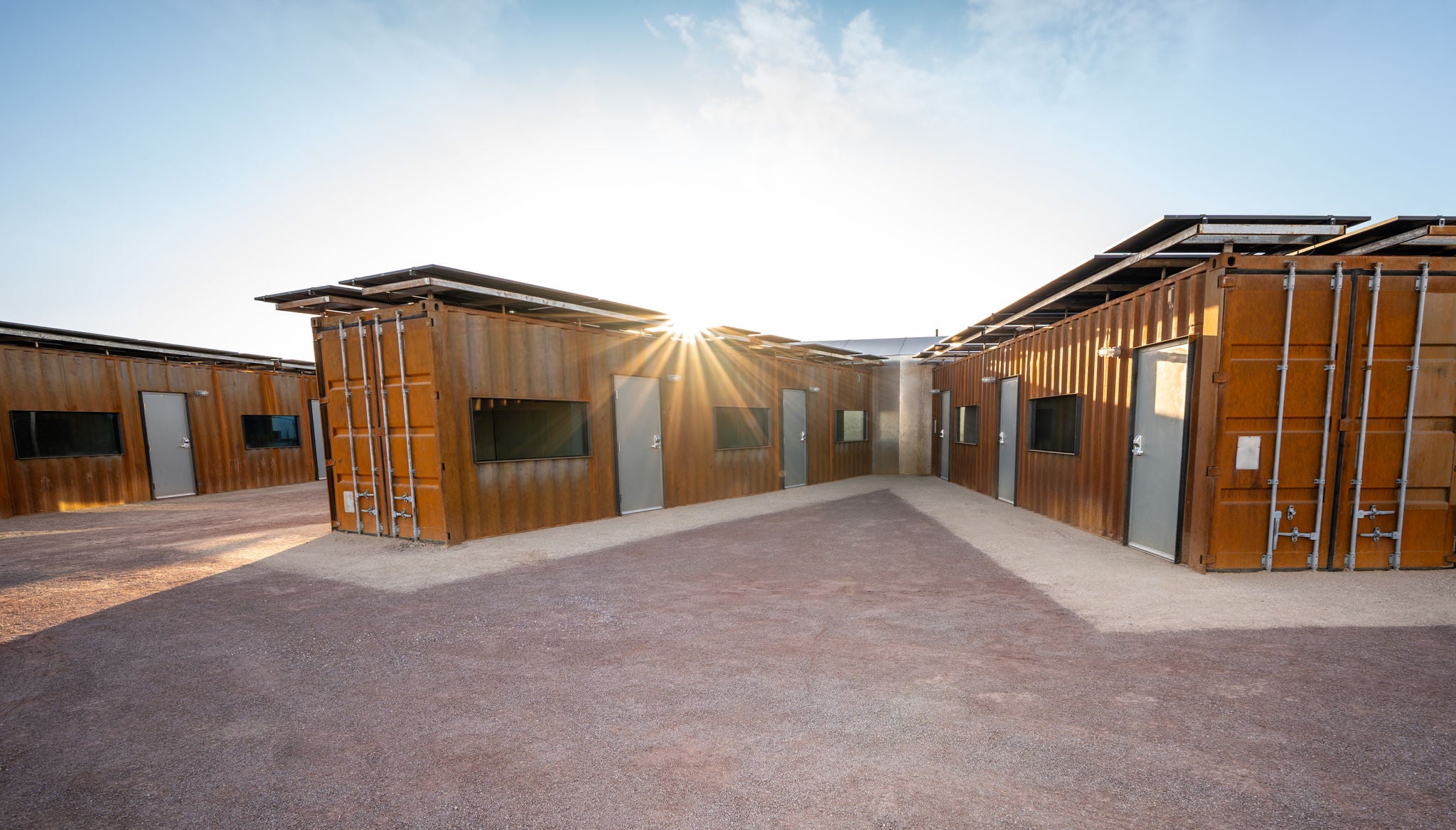
Overview
The Office of Homeless Solutions (OHS) provides support for people experiencing homelessness and is committed to ending homelessness through a comprehensive, regional approach to shelter and heat relief, outreach, supportive and behavioral health services, homelessness prevention, and supportive housing.
Phoenix's New Strategic Plan to Address Homelessness
In Feburary 2026, the Phoenix City Council approved an innovative new plan to address homelessness, building on progress made while aligning with community priorities. This comprehensive roadmap incorporates valuable feedback from residents and service providers, aiming to further reduce homelessness in Phoenix by 2029.
Phoenix Encampment Case Study
Bloomberg Associates conducted an in-depth analysis of the City of Phoenix’s efforts to address the area around the Key Campus in 2023. The study examined the City’s process and results and was developed to share the valuable lessons learned with other cities that can benefit from this knowledge. Read the findings outlined in the report.
Maricopa Association of Governments (MAG) leads the effort in collecting, managing and publishing regional homelessness data.
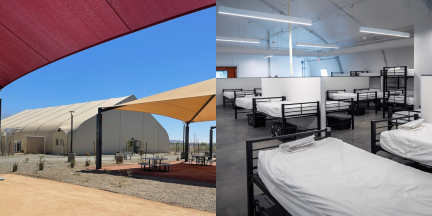
Phoenix Navigation Center
- Construction of a new shelter and resource center
- 200 congregate beds, 80 non-congregate beds, and space for recreational vehicles (RVs)
- Immediate employment component
- $7 million ADOH Investment; $13 million City of Phoenix Reallocated ARPA investment
- Phase 1 opened July 2024, Phase 2 opened March 2025

The Haven - Central Arizona Shelter Services
- Acquisition and rehabilitation of a shelter for seniors, 170 shelter units
- $4 million City of Phoenix investment, $7.5 million ADOH investment
- Opened January 2025
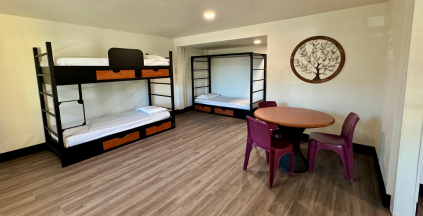
UMOM New Day Center- Family Shelter
- Rehabilitation of office building for 20 new family shelter units, 100 new beds
- $2 million City of Phoenix investment
- Opened November 2024
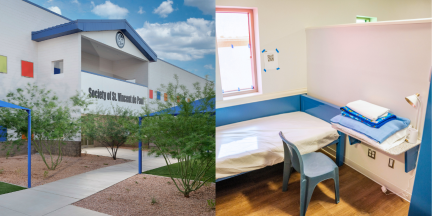
De Paul Manor- St. Vincent de Paul
- New construction of 100 units of transitional housing
- $6 million investment each by the City of Phoenix, Maricopa County & Arizona Department of Housing
- Opened summer 2024
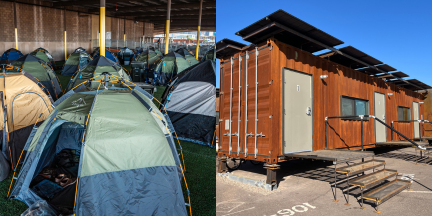
Safe Outdoor Space
- A voluntary, safe outdoor place for unsheltered individuals who may not be ready for indoor shelter opportunities
- 200 campsites, 300 people
- Onsite services such as housing navigation, case management, meals, showers and restrooms
- Opened October 2023
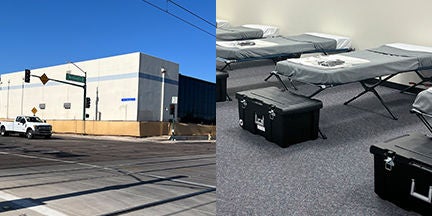
Washington Relief Shelter
- Rehabilitation of City-Owned Building for temporary shelter, 200 new shelter units
- St. Vincent de Paul shelter operator
- Maricopa County and City of Phoenix Shared Investment
- Opened May 2022
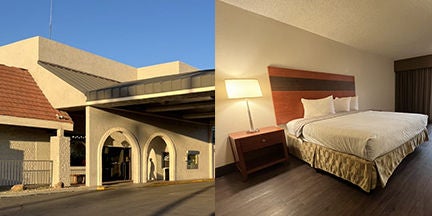
Rio Fresco - Community Bridges, Inc.
- Hotel purchase, 117 Rooms
- Prioritizes serving people who are unsheltered in the area and around the Key Campus
- $12.5 million acquisition, City of Phoenix & Maricopa County shared investment
- Opened November 2022
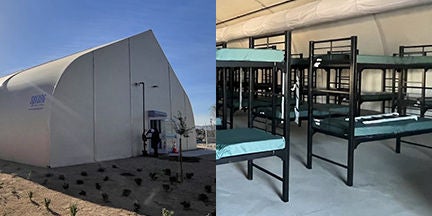
Respiro - Human Services Campus
- Acquisition and installation of a Sprung Structure, 100 new shelter units
- $2.5 million City of Phoenix Investment
- Opened March 2022
North Mountain Healing Center- Community Bridges, Inc.
- Phase 1
- 40 new units
- Acquisition and rehabilitation of a commercial building for shelter
- $4 million City of Phoenix investment, $6 million Maricopa County investment
- Opened November 2024
Central Arizona Shelter Services– Single Adult Shelter
- Added 175 additional shelter units
- $1.5 million City of Phoenix investment
- Completed early 2022
Salvation Army - Family Shelter
- New construction of family shelter “pod” creating 12 new family shelter units
- 60 new total beds
- $6 million City of Phoenix investment
North Mountain Healing Center- Community Bridges, Inc.
- Phase 2
- Acquisition and rehabilitation of a commercial building for shelter
- 60 new units
- $4 million City of Phoenix investment, $6 million Maricopa County investment
Senior Bridge
- 40 units of transitional housing
- Converted shipping containers for seniors 55+
- Future phase includes permanent supportive housing
Help and Resources
-
Connect Someone in Need With Services
Find resources in Phoenix, compiled by the Office of Homeless Solutions.
-
Personal Property Storage
The City of Phoenix stores unattended personal property citywide. Learn more about the process or reconnect with your stored property.
-
Hotline for Help
211 Arizona has over 8,500 local and statewide resources.
Healthy Giving Opportunities
City of Phoenix:
Residents who want to help can give back at the Phoenix Navigation Center and the Safe Outdoor Space.
To get started, view our donation criteria.
We also require all potential donors to fill out an application to ensure we're meeting the needs of the people at the site. Fill out an application.
Other Healthy Giving Opportunities:
Strategies to Address Homelessness
The Phoenix City Council requested a strategic plan to focus on strategies for persons experiencing homelessness as well as developing best practices to mitigate impacts to surrounding communities and neighborhoods. Read the Strategies to Address Homelessness Plan.
In January 2021, a task force made up of neighborhood leaders, service providers, and homeless advocates began meeting to prioritize and provide recommendations on the City’s efforts to deploy the Plan. Throughout 2021, the Task Force met to review and evaluate the City’s Strategies to Address Homelessness Plan. The recommendations were made in consensus among the Task Force members and were presented to the Phoenix City Manager as well to the Phoenix City Council Community and Cultural Investment Subcommittee on April 6, 2022. Read the recommendations or watch the Subcommittee presentation.
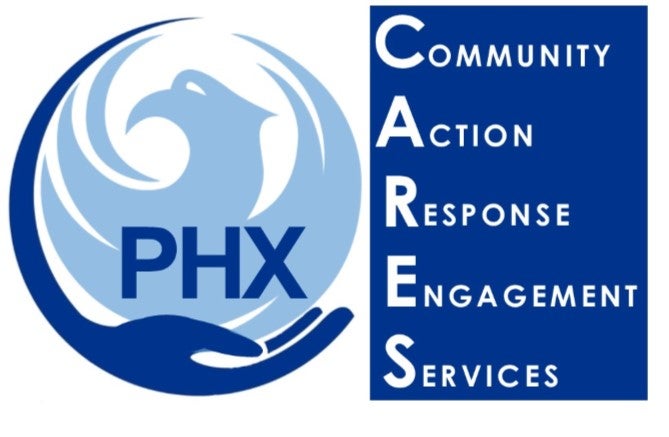
Report Concerns
PHX C.A.R.E.S. is a coordinated response for neighborhoods & individuals experiencing homelessness, offering education, resources & encampment cleanups.
At its core, PHX C.A.R.E.S. is the city's process of connecting the community with services like encampment cleanups, shelters, and other resources for individuals and families experiencing homelessness.
If residents have concerns about encampments or see individuals who are in need of resources or services they can contact PHX C.A.R.E.S. at 602-262-6251 or submit a report online.
